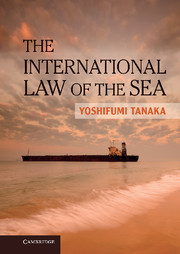Book contents
- Frontmatter
- Contents
- Preface
- Acknowledgements
- Figures
- Tables
- Abbreviations
- Table of Cases
- Table of Treaties and Instruments
- Part I The Divided Oceans: International Law Governing Jurisdictional Zones
- 1 The Law of the Sea in Perspective
- 2 Baselines and Related Issues
- 3 Marine Spaces under National Jurisdiction I: Territorial Sovereignty
- 4 Marine Spaces under National Jurisdiction II: Sovereign Rights
- 5 Marine Spaces beyond National Jurisdiction
- 6 Maritime Delimitation
- Part II Our Common Ocean: Protection of Community Interests at Sea
- Index
- References
6 - Maritime Delimitation
Main Issues
from Part I - The Divided Oceans: International Law Governing Jurisdictional Zones
- Frontmatter
- Contents
- Preface
- Acknowledgements
- Figures
- Tables
- Abbreviations
- Table of Cases
- Table of Treaties and Instruments
- Part I The Divided Oceans: International Law Governing Jurisdictional Zones
- 1 The Law of the Sea in Perspective
- 2 Baselines and Related Issues
- 3 Marine Spaces under National Jurisdiction I: Territorial Sovereignty
- 4 Marine Spaces under National Jurisdiction II: Sovereign Rights
- 5 Marine Spaces beyond National Jurisdiction
- 6 Maritime Delimitation
- Part II Our Common Ocean: Protection of Community Interests at Sea
- Index
- References
Summary
As discussed in previous chapters, in the international law of the sea, human activities in the ocean are regulated according to multiple jurisdictional zones. Thus the spatial distribution of jurisdiction of States is the foundation of oceans governance. In determining the spatial extent of coastal State jurisdiction, a question that may arise is the situation where the jurisdiction of two or more coastal States overlaps. In this case, delimitation of the overlapping marine spaces is at issue. It will deal with rules of international law with regard to maritime delimitation. This chapter will focus mainly on the following issues:
What is the cardinal principle applicable to maritime delimitations?
What are the basic approaches adopted by international courts and tribunals with regard to maritime delimitations?
What are the advantages and disadvantages of the basic approaches to the law of maritime delimitations?
What are the principal relevant circumstances in the law of maritime delimitation?
What is the role of international courts and tribunals in the development of the law of maritime delimitations?
How is it possible to reconcile the requirement of predictability and that of flexibility in the law of maritime delimitation?
Introduction
The spatial ambit of coastal State jurisdiction over marine spaces in the law of the sea is, in principle, defined on the basis of distance from the coast. In this regard, a question which may arise is how it is possible to delimit marine spaces where the jurisdictions of two or more coastal States overlap. Without rules on maritime delimitation in spaces where coastal State jurisdictions overlap, coastal States cannot enjoy the legal uses of maritime spaces effectively. Hence the law of maritime delimitation is of paramount importance in the law of the sea. In this regard, particular attention must be drawn to two issues.
- Type
- Chapter
- Information
- The International Law of the Sea , pp. 186 - 216Publisher: Cambridge University PressPrint publication year: 2012



